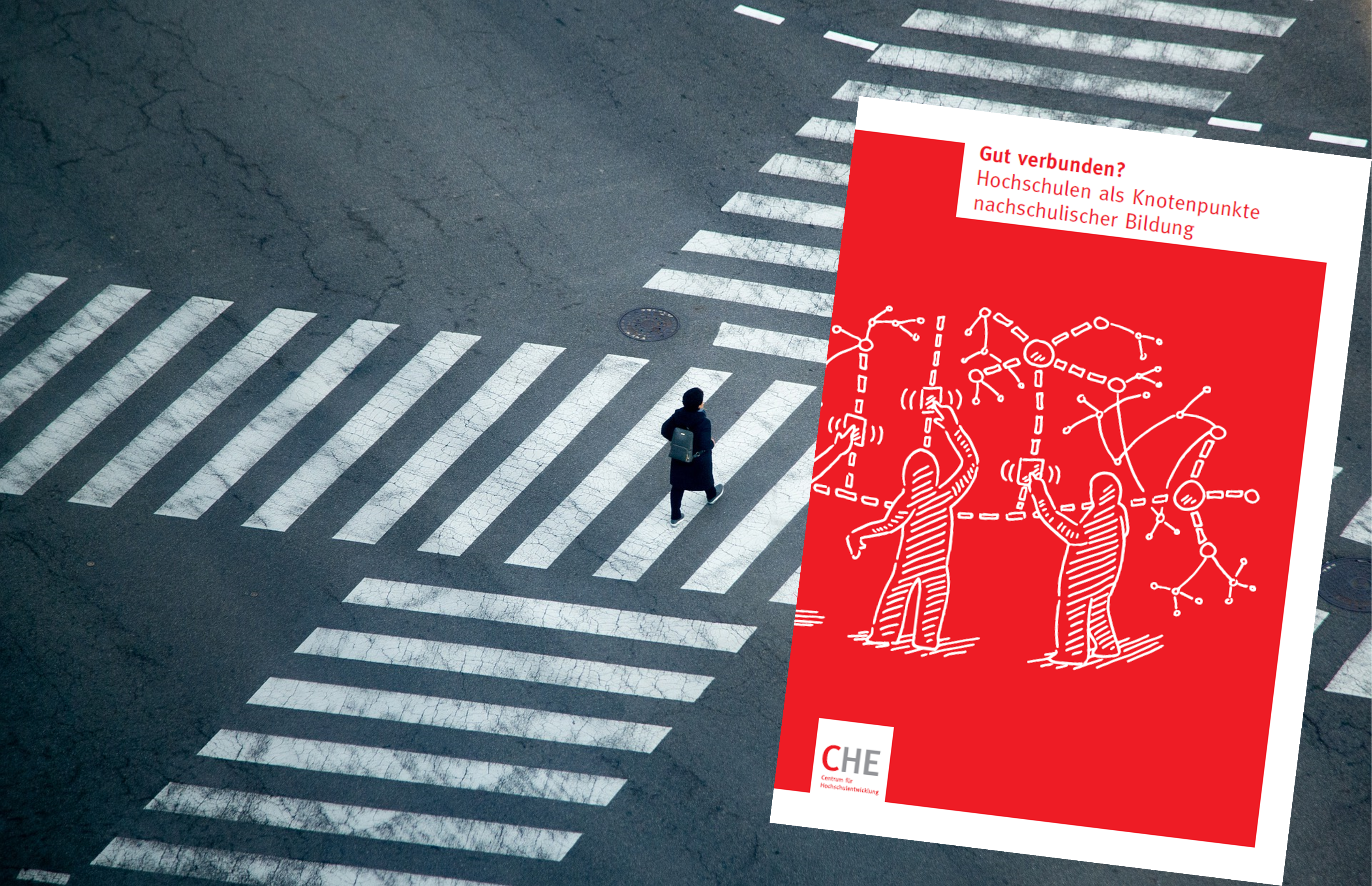 Foto: Pixabay | Montage: CHE
Foto: Pixabay | Montage: CHEBe it studies for non-traditional applicants or dual study options – a growing number of people in Germany want the best of both education systems. But there is a lack of transitions and bridging opportunities between vocational and academic education. In a new brochure, the CHE Centre for Higher Education therefore calls for a user-centred rethink of post-secondary education.
There is an unmistakable trend towards studying in Germany. The student population has grown from just under two million in 2005 to around three million today. And yet the shift towards academic programmes does not represent an abandonment of practice. Within the higher education system, there has been a particularly sharp rise in programmes that combine an academic approach with practical relevance. Indications of this include a higher demand for universities of applied sciences and dual study options that combine elements of academic and vocational education.
In 2016, around a quarter of students had already completed vocational training. Some 66,000 students opted for the third route into higher education in 2020, and were studying despite not having a formal higher education entrance qualification (Abitur). According to estimates by CHE in spring 2022, up to 80 per cent of the population in Germany would theoretically be eligible to go to university on the basis of their professional qualifications.
“Nowadays, prospective learners quite naturally want the best of both worlds. But the decades-old stereotype thinking in Germany makes it unnecessarily difficult for them to switch between academic and vocational education,” summarised CHE Executive Director Frank Ziegele. “Unfortunately, it is more a matter of poaching potential students from the other side rather than creating flexible educational careers by collaborating with each other”.
Particularly problematic in this context are the opportunities for entering higher or vocational education and switching between the two, as well as a lack of routine procedures for the recognition of prior learning, whether vocational or academic. Students wishing to switch from one type of education to the other are usually dealt with on a case-by-case basis, not only when it comes to integrating people with vocational qualifications into the higher education system, but also when it comes to recognising academic achievements in vocational education and training programmes. This process is often associated with uncertainties and unknowns for those seeking education.
Examples from the CHE brochure “Gut verbunden? Hochschulen als Knotenpunkte nachschulischer Bildung” (Well connected? Higher education institutions as points of intersection for post-secondary education) show that it need not be that way.
- For instance, the NRW talent scouting programme provides secondary school students – especially from less academically oriented families – with advice and support on whether to do an apprenticeship or a degree, with no preconceived views as to the outcome.
- The SWITCH programme in Aachen brings together students who are thinking of dropping out of university with more than 300 potential training companies from the region to discuss the possibility of doing fast-track training at a later stage – before they are removed from the register.
- The O ja! Orientierungsjahr Berlin (Oh yes! Orientation year Berlin) programme gives young people the opportunity to get a taste of STEM degree programmes at HTW Berlin – University of Applied Sciences and apprenticeship trades for a year, after which time they are then required to opt for the educational path that suits them. Not only that – student grants (BAföG) are available throughout, and credits gained can be transferred to the relevant degree programme or apprenticeship that the student goes on to take.
These examples show that a user-centred rethink of post-secondary education is feasible and already functions on a small scale, stated Frank Ziegele. “Germany needs innovative bridging between academic and vocational education. Prospective learners will only truly be able to get the best of both worlds for their individual educational biographies if there are points of intersection in the overall system of post-secondary education,” commented the CHE Executive Director.
But before this can happen, the stereotype thinking of all stakeholders in academic and vocational education and training, which is still all too often prevalent, must be overcome, stated the authors of the CHE brochure. A jointly designed system of post-secondary education need not automatically be at the expense of vocational education – on the contrary, it could help it to strengthen its distinctive profile and to benefit from the interaction between the two types of education.
CHE Executive Director Frank Ziegele is optimistic about the ability to bring about such a radical change in the German education system. “The bold and innovative crisis management undertaken by universities and ministries of science at the start of the COVID-19 pandemic has shown what can be achieved in the face of pressure to change,” remarked Ziegele.
About the publication:
CHE has been focusing intensely on the junctures between vocational and academic education for some time. For instance, it regularly conducts surveys on studying without Abitur, as well as on part-time, continuing education and dual study programmes. This publication brings together current developments; highlights the background, problems and opportunities of a jointly designed post-secondary education system; and provides examples of good practice. The brochure “Gut verbunden? Hochschulen als Knotenpunkte nachschulischer Bildung” was written by Ulrich Müller, Jan Thiemann, Frank Ziegele, Melisande Riefler, Silvia Kremer, Olaf Kordwittenborg and Sonja Berghoff.
More www.che.de/nachschulische-bildung/
Gut verbunden? Hochschulen als Knotenpunkte nachschulischer Bildung 25. April 2022 3.59 MB 20487 downloads
Müller, Ulrich; Thiemann, Jan; Ziegele, Frank; Riefler, Melisande; Kremer, Silvia;...Interview with Frank Ziegele in Deutschlandfunk (25.04.2022)
"Eine App für nachschulische Bildungswege und Übergange" (Interview Frank Ziegele im DLF 25.04.2022) 28. April 2022 0.00 KB 11878 downloads
CHE Geschäftsführer Frank Ziegele erläutert im Gespräch mit dem Deutschlandfunk...Article from Frank Ziegele in Die ZEIT (28.04.2022)
